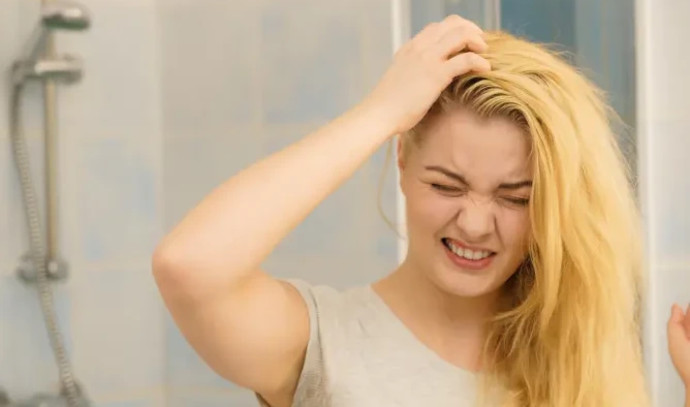The scalp is a grating issue, in fact anyone who deals with an itchy scalp knows the phenomenon that can develop all year long. There are quite a few reasons for the annoying sensation experienced by the majority of the population. Dr. Sivan Mercer, an expert in aesthetic and laser dermatology, sorts out the well-known and less-well-known symptoms of itching.
In general, it is important to calm down and understand that most problems such as lice or autoimmune diseases like psoriasis are solvable and have a quick medical response. However, itching can be caused by other factors like allergies, pre-cancerous lesions, stress and nerve problems, among other issues.
These require deeper and longer treatment, where the procedures require professional help and treatment which is a more complex process, and these are cases where the more you itch, the worse the condition may become. Here are some tips to get things in order.
Lice
Appearance and feeling: A general itching all over the head, a sensation as if something is traveling on the scalp and tickling it. Lice eggs can be identified as miniature grains of rice glued to the hair itself.
Causes: Lice get to the head from head-to-head contact, or from a product that goes from one head to another such as a hat or a hairbrush.
How to ease the situation: It is important to thoroughly clean the hair with a comb and special products to prevent lice. It is important to take care of clean hair at all hours of the day and clear lice eggs as much as possible. In exceptional cases and if they do not pass or die, prescription drugs available for exceptional cases should be considered.
Dandruff
Appearance and feeling: White flakes that cause itching all over the head.
The causes: Dandruff is often caused by an oily (not dry) scalp, the accumulation of dead skin or styling product residues that simulate a scaly condition or a yeast-like fungus called Malassezia.
How to ease the situation: The scalp should be vigorously massaged with a shampoo. It should be massaged into the scalp itself and not just on the hair, there will usually be shampoos that are anti-dandruff, or preparations specially prepared by a dermatologist’s prescription for this reason.
Seborrheic Dermatitis
Appearance and feeling: Seborrheic dermatitis, also known as seborrhea, is a very common skin condition. Dandruff is an example of mild seborrheic dermatitis. Both lead to a dry and itchy scalp, but seborrheic dermatitis causes redness, swelling and inflammation in the area, in addition to the flaky skin.
Causes: There is no specific cause to spot, but there are common triggers such as hormones and stress, sometimes as a result of high fever due to illness, and sometimes even too little shampooing is the cause.
How to ease the situation: Anti-fungal shampoo is often the best option for this condition. More specifically, ciclopirox shampoo is an anti-fungal medication specifically used to treat seborrheic dermatitis.
Atopic dermatitis
Appearance and feeling: Itching and redness in the entire scalp. It is most likely to appear on the elbows and backs of the knees.
Causes: Mostly genetic, so it’s more likely that if it runs in the family, it’s probably atopic.
How to ease the situation: It’s important to take short, hot showers, to understand where the trigger is. You should also use a shampoo or a perfumed scent that relieves the irritation.
Psoriasis
Appearance and feeling: Patches with a rough crust, and a lot of itchiness.
Causes: This is an autoimmune condition and is therefore affected by variables such as weather and mental stress, bacterial infection and even certain medications that trigger a flare-up of the disease.
How do we ease the situation: Immediate intervention by a dermatologist in order to reach a diagnosis. This allows for proper treatment. This can include a daily shampoo containing coal tar, which can soothe and anesthetize the disease. You can also receive steroid medication if necessary.
Allergic reaction
Appearance and feeling: An itchy sensation covers the entire scalp and this leads to redness and irritation.
Causes: Ingredients in certain hair products are often the main cause of a localized itching allergic reaction, often caused by an allergen in hair products called propylene glycol. Pay attention if you are known to be overly sensitive.
How do we ease the situation: Immediately stop using the product, of course. If the irritation has not passed and has not stopped after 48 hours, consult a dermatologist and at the same time wash your hair frequently and use hypoallergenic hair products.
Precancerous lesion
Appearance and feeling: A prominent spot about a quarter of an inch in diameter is the most common sign. It can appear as red, scaly and itchy spots. Hair loss can be caused by the focused and intense scratching in these cases.
The cause: This is called actinic keratosis, the result of exposure to the sun over many years, of which about 10 percent actually become cancerous, so it is important to seek a doctor’s diagnosis as soon as possible and consider its removal.
Scabies
Appearance and feeling: Intense and annoying itching. There can also be the appearance of irritated skin.
Causes: Scabies is caused by tiny mites that burrow into the scalp. It is not very common, but the patients who suffer from it often have been in contact with someone else who suffers from it, even if they only shared a public place that is not clean enough, such as a hotel room or public changing rooms at a pool.
How do we ease the situation: In these cases only a dermatologist and in a rather urgent manner will solve the situation, these are not cases for OTC preparations without a prescription, they most of the time do not help.
Ringworm of the scalp
Appearance and feeling: Scales most often, although it can also be a round spot with raised borders.
The causes: This is a fungal infection, so contact with an infected patient is the main cause. There are also root causes from pets and puppies, which can cause the parasite.
How do we ease the situation: In mild cases, an anti-fungal shampoo may do the trick. However, if the itching is really severe, a steroid lotion or ointment may be the key to relieving the condition. There are cases in which oral anti-fungal drugs will solve the problem and of course the doctor’s recommendation is necessary here.




